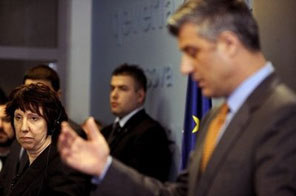EU foreign policy chief urges help for Kosovo economy
PRISTINA: The EU foreign affairs chief on Friday called for more effort to help economic growth in Kosovo, the contested Balkan territory which is among Europe's poorest regions.
Kosovo unilaterally declared independence in 2008, after nine years under UN administration following a NATO-led bombing campaign which ousted Serb troops.
But economic development has been slow -- official data show 40 percent unemployment and nearly half the population living in poverty -- and Catherine Ashton said work was needed to help the people of Kosovo enjoy closer EU ties.
"It is very important that we build together a kind of economic development that will enable people in Kosovo to reap the benefits of moving closer towards the European Union," Ashton said after a meeting in Pristina with Kosovo's Prime Minister Hashim Thaci.
"And that we can do by support through trade, through projects, through economic growth," she said.
"Kosovo belongs in Europe. The region is a great priority for me."
Pristina was the last leg on Ashton's three-day tour of the Balkans, her first since taking the job as the 27-nation bloc's new foreign affairs supremo, which also included stops in Belgrade and Sarajevo.
Some 15 percent of people in the majority ethnic-Albanian territory live in extreme poverty, and the international community has spent an estimated four billion euros (5.4 billion dollars) supporting it since the UN administration took over in 1999.
Since Kosovo split from Serbia in February 2008, it has been recognised by 65 countries, including the United States and all but five EU member states.
Serbia considers Kosovo a breakaway province and has asked the International Court of Justice to rule on the territory's status.
In a speech in Belgrade on Wednesday, Ashton said the EU regarded Kosovo's future as European, even though five member states -- Spain, Greece, Slovakia, Romania and Cyprus -- have not acknowledged Kosovo's independence.






